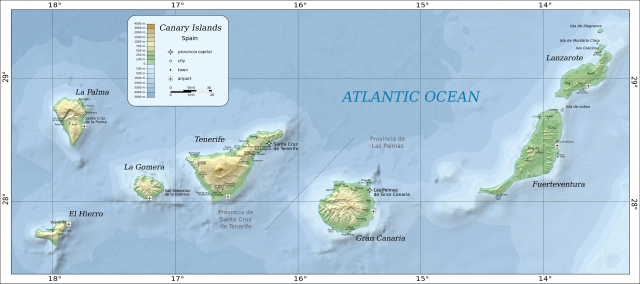Canaries
The Canaries are a group of seven volcanic islands that lie off the northwestern coast of Africa. The westernmost islands are actually the peaks of mountains that rise from the ocean floor to heights several thousand feet above sea level. The eastern Canaries are much flatter.
Gran Canaria and Tenerife are the two most important islands. The Canaries have a fairly consistent subtropical climate year-round with temperatures ranging between 64°F and 79°F and little rainfall. Vegetation varies by altitude. Plants suited to hot, dry conditions grow at lower elevations, while fruits and vegetables are raised at elevations above about 1,400 feet. Bananas are the most important export crop, along with potatoes, tomatoes, oranges, and grapes. Since the 1960s, however, tourism has been the mainstay of the economy, and some 80 percent of the island's inhabitants are connected in some way with the tourism. Aside from a large petroleum refinery in Santa Cruz that processes crude oil, there is little industry on the islands.

The Canaries were originally inhabited by a North African Berber people known as the Guanche. The king of MAURITANIA visited the islands in about 40 B.C., a journey that was noted by the ancient Romans. The name of the islands probably comes from the Latin word canis, meaning dog, because of the many large dogs found there. European sailors first arrived in the 1200s, and Spanish settlers took over the islands during the 1400s. For hundreds of years the Canaries served as an important port on Spain's transatlantic route to the Americas. Christopher Columbus stopped in the islands for supplies on each of his westward voyages across the Atlantic.
The Canaries were a Spanish province until 1927, when rivalry between the main islands of Gran Canaria and Tenerife caused Spain to split them into two separate provinces. In 1982 the entire island group became a self-governing community, electing its own representatives to the Spanish parliament and senate. Most of the islands' approximately 1.5 million inhabitants are descended from the original inhabitants and the Spanish conquerors. The two major cities are Las Palmas and Santa Cruz. Canarians speak Spanish and the local culture is largely Catholic. (See also Colonialism in Africa.)